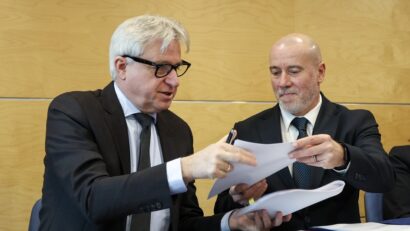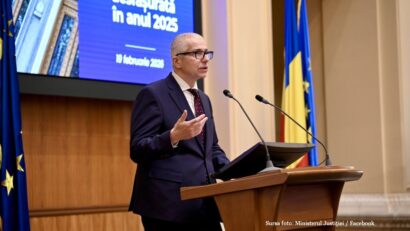Measures for the Romanian education
Several laws targeting education in Romania were included on the agenda of the Romanian Government’s Thursday meeting.

Roxana Vasile, 25.04.2025, 13:50
During Thursday’s meeting, the Romanian government discussed several laws related to education. They established the legal framework for organizing the tenure exam for the teaching staff in pre-university education, with the aim of hiring staff for the over 62,000 positions currently occupied on a fixed-term or on hourly-payment basis and whose contracts expire at the end of the summer. Thus, they avoid the risk of almost a quarter of all positions remaining vacant as of the autumn.
Asked about the discussions on performance-based teacher pay, the education minister Daniel David said that he would like teachers to be rewarded, in addition to the basic salary, according to the pay scales established at national level, if they achieve results in disadvantaged areas or areas involving inclusive education, and also if their students have high success rates in national exams or school Olympiads. A proposal in this regard will be presented upon the presentation of the evaluation report on the Romanian education system, promised for next month, said Daniel David, who added that he supported the idea that the pay scale should start from the average salary for beginner teachers. The decisions made during Thursday’s government meeting also concerned university education.
Here is minister Daniel David with details: ʺTwo other very important government decisions refer to such areas as the bachelor’s degree, the master’s degree, the doctoral degree and, very importantly, the specializations and programs. Future students should know that what is not mentioned in these government decisions does not exist from the point of view of official accreditation, so they should not follow programs other than those that are in these two government decisions. There are several new programs such as, for instance, at the bachelor’s level, Computer Security and Data Science, or Technologies and Systems for Intelligent Mobility. At the master’s level, for the first time in Romania, we have programs such as Artificial Intelligence for Connected Industries, or Sustainable Technologies for Recycling Metallic Materials. They also correspond to the phase we are going through as a civilization, a new industrial revolution, so I am glad that they are anchored in this revolution.ʺ
Unfortunately, however, the percentage of higher education graduates in Romania, in relation to the general population or in relation only to the group of young people aged 24-34, ‘looks bad’ compared to the European average. According to the education minister, Daniel David, in relation to the general population, Romania has only 16% higher education graduates, compared to about 30% in the EU. In relation to the group of people aged 24-34, Romania has between 23% and 26% of graduates, compared to 40-43% in the rest of the continent. ‘This makes us vulnerable’ said the education minister, who announced that, in the coming days, a ministerial order regarding university dropout will be drafted. (LS)






























